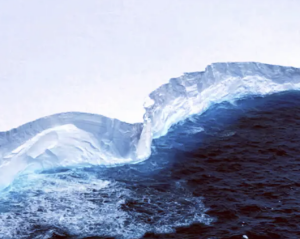This iceberg is "not something that is necessarily human-made, a climate problem -- it's not that," says Siegert. "There's loads of icebergs calving all the time."
西格特说,这座冰山“不一定是人为造成的,不是气候问题,并非如此。一直都有大量冰山在崩裂”。
But it helps to shine a spotlight on climate issues the region is struggling with.
但它有助于聚焦该地区正在面临的气候问题。
"Antarctica is experiencing mass loss to global warming and burning fossil fuels," he says.
他说:“南极洲正因全球变暖和化石燃料燃烧而经历大规模冰量流失。”
Ice sheets in Greenland and Antarctic are losing ice six times more quickly than they were 30 years ago.
格陵兰岛和南极洲的冰盖流失速度比30年前快了六倍。
"There's been an acceleration in the loss of the number of icebergs," says Meijers. "Big 'berg calvings are important, but a lot of it happens in much smaller chunks."
迈耶斯说:“冰山数量的减少一直在加速。大冰山的崩裂很重要,但很多时候是以小得多的冰块形式发生的。”
It doesn't take much to change these vulnerable ecosystems, and Siegert is concerned about the consequences of Antarctica's ice loss.
改变这些脆弱的生态系统并不需要太多因素,西格特担心南极洲冰量流失的后果。
"This is a fragile environment," he says.

Melting Antarctic ice sheets have a global ripple effect.
南极冰盖融化会产生全球性的连锁反应。
The Southern Ocean helps to regulate the world's climate by absorbing both heat and carbon, but warming waters make this harder. The melting also causes sea level rise.
南大洋通过吸收热量和碳来帮助调节全球气候,但海水变暖使这一过程变得更加困难。融化还会导致海平面上升。
"There's two meters of sea level rise locked in," says Meijers. "There's nothing we can really do about that."
迈耶斯说:“已经锁定了两米的海平面上升。对此我们实际上无能为力。”
For South Georgia, one thing's certain.
对于南乔治亚岛来说,有一点是肯定的。
"It's definitely going to shake things up," says Vernet, "but it's too early to tell whether it will be positive or negative for the ecosystem."
韦尔内说:“这肯定会引发一些变化,但现在判断它对生态系统是积极还是消极影响还为时过早。”
Says Siegert: "from quite a cold, objective scientific perspective, it's actually quite an interesting phenomenon."
西格特说:“从相当冷静、客观的科学角度来看,这实际上是一个相当有趣的现象。”



